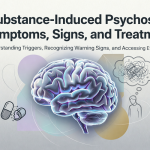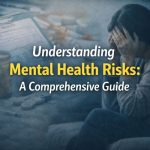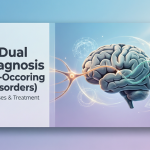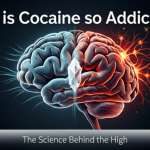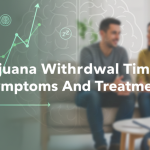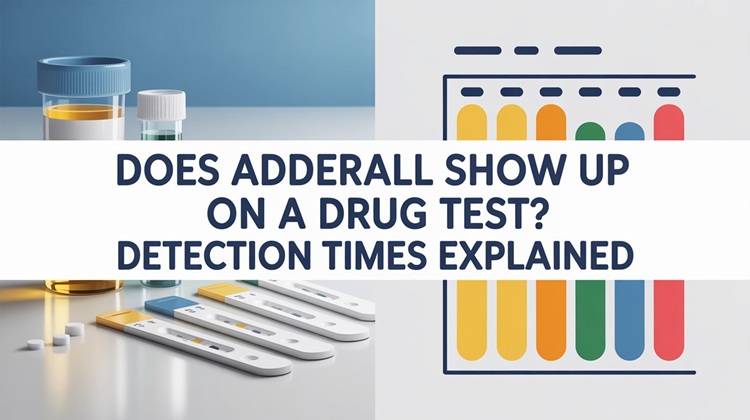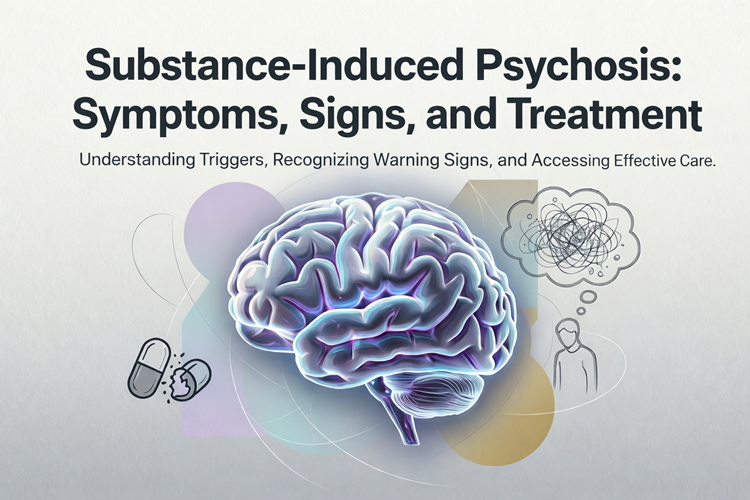Schizoaffective disorder is a serious and difficult-to-treat psychiatric disorder that has features of schizophrenia and mood disorders including bipolar or major depressive episodes. It affects approximately 0. 3% of the population and poses a rather specific diagnostically related challenge as the patient displays both psychotic manifestations and affective disorders. Some of the common signs of schizoaffective disorder should be identified to avoid its clinical diagnosis being delayed. In this blog, we will explain five common symptoms of schizoaffective disorder, giving an understanding of the consequences and meaning of these signs.
1. Hallucinations
Hallucinations are predominant in all types of schizoaffective disorder, affecting how individuals perceive and interact with their environment. While hallucinations affecting patients are common in schizophrenia and can occur in isolation, schizoaffective disorder involves mood swings in addition to hallucinations. Auditory, which means hearing things that are not real, is the most frequent hallucination diagnosed in individuals with schizoaffective disorder.

Definition and Types
This is characterized by hearing voices, sounds, or noises that other people cannot hear. These voices may be insulting, ordering or just talking and can be disturbing and confusing for the person. Though not as frequent as in schizophrenia, visual hallucinations which can make the person see objects or people that are not there can also manifest in schizoaffective disorder.
Impact on Individuals:
The current study also determined that hallucinations greatly impact the patient’s overall quality of life and ability to function independently in their daily life. People may have problems focusing, communicating, or executing daily responsibilities in jobs or schools. The suffering related to the hallucinations might lead to withdrawal and social isolation which only adds to the consequences of the disorder.
2. Delusions
Delusions in schizoaffective disorder are false beliefs that persist despite evidence to the contrary. Such beliefs usually remain in the sphere of persecution, grandiosity, or reference. Hallucinations directly relate to sensory experiences, while delusions are beliefs that cause a patient to have a bizarre and completely skewed reality.
Types of Delusions:
- Persecutory Delusions: Feelings that one is persecuted, harassed, or that others are out to get him or her.
- Grandiose Delusions: Symmetrical to the cognitive side of the condition, grandiose illusions refer to the overestimation of one’s competence, personal characteristics, or self-importance.
- Referential Delusions: A tendency to assume an incorrect relationship between oneself and other people and their actions as well as other occurrences.
Real-Life Implications
Delusions can lead to unusual conduct since people try to defend themselves from possible dangers or, on the contrary, try to dominate others. For instance, a person diagnosed with schizoaffective disorder may refuse to go out because the person believes that one is trailed or has left a job believing that one is supposed to do something great.
100% Confidential Support is Available 24/7
No matter what you’re going through, you’re not alone. Our dedicated team is here to provide a safe, judgment-free space where you can talk openly and honestly. Whether you need emotional support, resources, or just someone to listen.
We’re here for you—completely confidential and always respectful of your privacy. Call us today!
3. Mood Episodes
Schizoaffective disorder includes prominent mood disturbances, alternating between depressive and manic episodes. These episodes are distinct from hallucinations and delusions but are integral to the diagnosis and management of the disorder.
Depressive Episodes
During depressive episodes, individuals experience intense sadness, loss of interest in activities they once enjoyed, and feelings of worthlessness or guilt. Sleep disturbances, changes in appetite, and difficulty concentrating are also common.
Manic Episodes
Manic episodes are characterized by elevated mood, increased energy, and inflated self-esteem. Individuals may engage in risky behaviors such as overspending, reckless driving, or making impulsive decisions without considering the consequences.
Deland Treatment Solutions
Battling with Drug and Alcohol Addition? Remember, you are not alone and we are here to help you!
4. Disorganized Thinking
Disorganized thinking means being confused in thought and language or having an impaired ability to put thoughts into words. This is a cognitive effect that may present in speech, thereby affecting how people with schizoaffective disorder interrelate with others.
Symptoms and Manifestations
- Tangential Speech: Frequently switching from one topic to another with no relation between them.
- Loose Associations: Making hyperassociations that are quite hard for other people to discern or appreciate.
- Word Salad: Combining words and phrases in a way that does not make sense
Impact on Communication
This makes communication difficult leading to frustration in social or work-related interactions for individuals affected by it. It also leads to social isolation as people lose their ability to effectively express themselves.
5. Cognitive Impairment
Cognitive impairment is another characteristic feature of schizoaffective disorder that influences learning, executive functioning, and memory. These cognitive disturbances can affect an individual’s ability to function in his or her daily environment and contribute to the overall disability associated with the disorder.
Areas Affected
- Memory: Forgetting things that have been said or done and being unable to learn new things as before.
- Attention: Having difficulty in staying aware and on task or having trouble focusing for long, straight, or continuous hours.
- Executive Functioning: Problem-solving, particularly in the areas of planning and decision-making.
Daily Challenges
Cognitive impairment might render it difficult for a person to execute his/her duties on the job, take care of home chores, or even participate in communal events. It might also influence their compliance with treatment regimens and overall engagement/incorporation in therapy.
Schizoaffective disorder is a severe type of schizophrenia that consists of both psychotic and affective symptoms. It is also important to diagnose schizophrenia drugs’ side effects and general symptoms. By understanding these symptoms and their impact, individuals affected by schizoaffective disorder can receive appropriate treatment and support to improve their quality of life.

If you or someone you know is experiencing symptoms of schizoaffective disorder, it’s crucial to seek professional help. Early intervention can significantly improve outcomes. Call us at (386) 866-8689 Connect with a mental health professional today to discuss your concerns and explore available treatment options.







